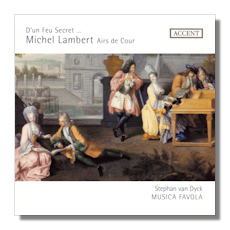
The Internet's Premier Classical Music Source
Related Links
-
Lambert Reviews
Lully Reviews - Latest Reviews
- More Reviews
-
By Composer
-
Collections
DVD & Blu-ray
Books
Concert Reviews
Articles/Interviews
Software
Audio
Search Amazon
Recommended Links
Site News
 CD Review
CD Review
Michel Lambert

D'un Feu Secret…
- Ombre de mon amant
- Iris n'est plus, mon Iris m'est ravie
- Que faites-vous, Sylvie?
- Ma bergère est tendre et fidelle
- Doux charmes du printemps
- Par mes chants tristes et touchants
- Pourquoy faut il belle Inhumaine
- D'un feu secret je me sens consumer
- Superbes ennemis du repos de mon ame
- Jean-Baptiste Lully:
- Trios pour le coucher du roi, LWV 35 (excerpt)
Musica Favola/Stephan Van Dyck
Accent ACC24234
Michel Lambert (1610-96) was a contemporary of Jean-Baptiste Lully, who lived from 1632 to 1687. Just as well thought-of in his time, Lambert's work (now much less well-known… barely a dozen CDs, and only one devoted entirely to his music, exist) is a veritable treasure-trove of invention, originality, creativity, expert orchestration, delicate melodic lines, even more delicate textures (listen to the weaving of timbres in Ombre de mon amant [tr.5] and tremendous sensitivity to the advanced and refined sensibilities of the French Baroque sound world, where text, voice, solo instrumentalist and small ensemble combined in an almost magical blend that seemed (largely through the use of "inward-looking" tonality by the likes of Lully, Lambert and Marin-Marais) to capture the hothouse atmosphere of the French Court in particular.
This music has an even more "localized" world, though: legitimately, it implicitly reflects Lambert's own abilities with the voice; as a singer. The composer was a renowned and much sought-after teacher too. The Air de Court is akin to a latter day courtly love song, where the lover is spurned, unhappy and potentially without hope. There are, though, works where the trope is taken less seriously … Ma bergère est tendre et fidelle [tr.12] is a parody of the genre, for instance. Nevertheless, the overall essence is one of dourness, sadness, lack, anguish and regret. Musica Favola with the studied and sinuous tenor of director Stephan Van Dyck achieve the necessary balance between entering into the world of hurt which has to be taken seriously for the music to have any meaning at all on the one hand; and consciously performing it with all its manners – so sympathetically, idiomatically and respectfully on the other.
With the advice of specialists, Van Dyck has chosen to sing in "français restitué" on this CD. An attempt was made to perform in one possible and supposed manner of the seventeenth century French court… the articulation of final consonants and a lack of nasality. It will sound unusual to some listeners. But never obtrusively so. The rationale is that it makes the music "sing" more. Maybe. It certainly supports a closer amalgam between music and text. There seems to be a greater unity and more obvious sense in the direction which the music takes as a result of this style.
It is intimacy as the parent (or child) of "secrecy" which pervades this recording. The stylish and utterly accomplished Musica Favola (whose only CD this appears to be) limit themselves to no more than five instruments (two violins, viola da gamba, theorbo or guitar, harpsichord) and voice. This works very well indeed. We feel closely involved in the performance. Where a light touch is required from the keyboard players in particular, it's always to be found. Where sweetness of tone in the combination of strings and harpsichord is needed, it's there in just the right measure. But the music of Lambert (and Lully), for all its intensity and sonorousness is never romanticized. When taken at this pace (the works on this CD are by and large slow in tempo… it contains a generous 70 minutes) we actually get every nuance and shade of meaning from the expertly-articulated texts. Nothing drags or is over-played. We come away understanding anguish and how words, when added to thoughtful melodic lines, can communicate anguish. Yet we are not ourselves anguished.
The idea to intersperse the dozen and a half trio sonata movements of Lully throughout Lambert's music has both advantages (of contrast and context) and potential disadvantages (confusion: whose music is this?). The excellent liner notes (they also contain all the texts in French, with English and German translations) which accompany the CD explain that it was a meeting between the two that so dramatically changed the course of Lambert's career. Indeed, their collaboration (Lambert's airs were used in Lully's works) was a significant one. What's more Lully's influence on Lambert shows in the rhythmic insistences of such pieces as Iris n'est plus, mon Iris m'est ravie [tr.15] and restrains of Que faites-vous, Sylvie? [tr.16]. Not least, Lambert was, after all, Lully's father-in-law.
The acoustic is close, dry but not unresponsive. This choice CD should be lapped up immediately by anyone familiar enough with the music of the later seventeenth century in France; and particularly quickly by those looking to expand their collection of the works of Lambert himself. There is precious little else currently available with which to celebrate the highly original music of Michel Lambert. To have something as carefully constituted and leaving us wanting more and as gently communicative as this CD is almost a luxury. It qualifies as a rarity. And a wholly recommendable one at that.
Copyright © 2011, Mark Sealey.





















